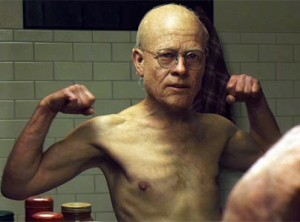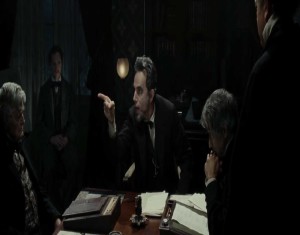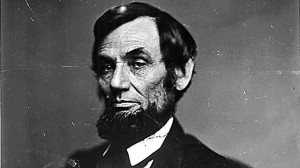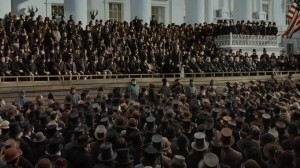**QUICK NOTE, from my friend Linda Frothingham over at Chicago Screenwriters Network: They are running a seminar for screenwriters interested in submitting to contests. Entitled “IS YOUR SCRIPT READY?” it will feature a Q & A with speakers Ade Akisanya, T.J. Cimfel & Jason Doty, all of whom are former Chicago Screenwriter Network contest winners. The event will be held at ROOTS, 1924 W. Chicago, on July 14th, from 4-5pm. It is free to all. Sign up at: http://www.eventbrite.com/
Great writing makes a sound. It takes breath away, sucks the oxygen from the room, punches you in the stomach. You know great writing when you hear it. Why? By the very absence of great writing. Genius, too. You know genius when you see it. How? By the very fact that you almost NEVER see genius. So when you do, you know it.
Two words: Tony Kushner. What a great script Lincoln is. You need to watch it twice just to grasp the ideas. It’s word heavy-aspect is the product of a playwright, of course. But Kushner does something with this script that’s very screenwriter-wise. This script avoids a standard biopic mistake—spreading the biographical net too far wide. So often writers try to tell the story of the protagonist from birth to death—major mistake! THE BABE comes to mind—opening with dad leaving the Babe off in the Orphanage all the way to when he’s the old and craggly Bambino about to die. It’s a hack move to not narrow the focus. By attempting to hit every moment in a life, you adequately represent none of them.
The other movie that comes to mind, yes a better movie but still just too damn much, was BENJAMIN BUTTON. I have a confession. I walked on Benjamin Button. Left the theater and popped into–Oh Christ–PAUL BLART, MALL COP! BB Just felt like a travelogue, a slide slow presentation with the decades peeling away so predictably. Cool makeup, I understand why they structured it like that, but other than the reverse aging bit, it just felt predictable and bland.
Now think about LINCOLN. It was a superb choice to show this man in a single, very short time frame. THREE weeks, to be precise. His fight to get the 13th Amendment passed is the singular focus of the movie.
We learn quickly about Lincoln’s goal in a scene with his wife Mary Todd Lincoln (Sally Field):
Mary studies Lincoln, thinking. Then a revelation:
MARY: I know…I know what it’s about. The ship, it isn’t Wilmington Port, it’s not a military campaign! It’s the amendment to abolish slavery! Why else would you force me to invite demented radicals into my home?
Lincoln closes his folio.
MARY (CONT’D): You’re going to try to get the amendment passed in the House of Representatives, before the term ends, before the Inauguration.
LINCOLN(standing:) Don’t spend too much money on the flubdubs.
Mary stands, goes up to him.
MARY: No one’s loved as much as you, no one’s ever been loved so much, by the people, you might do anything now. Don’t, don’t waste that power on an amendment bill that’s sure of defeat. Seeing that he’s not going to discuss this, she turns away, walking to an open window.
MARY (CONT’D): Did you remember Robert’s coming home for the reception?
Lincoln nods, though Mary isn’t bothering to look at him.
MARY (CONT’D): I knew you’d forget.
She closes the window.
MARY (CONT’D):That’s the ship you’re sailing on. The Thirteenth Amendment. You needn’t tell me I’m right. I know I am.
She watches as he leaves the room, smiling in bitter victory: she’s right.
She isn’t the only one telling Lincoln it would be a mistake to pursue this path. There is also his Secretary of State Seward:
EXT. A CARRIAGE, PENNSYLVANIA AVENUE, WASHINGTON – MORNING
In a four-door carriage, top down, Seward sits opposite Lincoln. Hay, next to Seward, organizes papers in a portfolio on his lap.
SEWARD: Even if every Republican in the House votes yes – far from guaranteed, since when has our party unanimously supported anything? – but say all our fellow Republicans vote for it. We’d still be twenty votes short.
LINCOLN: Only twenty.
SEWARD: Only twenty!
LINCOLN: We can find twenty votes.
SEWARD: Twenty House Democrats who’ll vote to abolish slavery! In my opinion –
LINCOLN: To which I always listen.
SEWARD: Or pretend to.
LINCOLN: With all three of my ears.
SEWARD: We’ll win the war soon – It’s inevitable, isn’t it?
LINCOLN: Ain’t won yit.
SEWARD: You’ll begin your second term with semi-divine stature. Imagine the possibilities peace will bring! Why tarnish your invaluable luster with a battle in the House? It’s a rats’ nest in there, the same gang of talentless hicks and hacks that rejected the amendment ten months back. We’ll lose.
Lincoln smiles.
LINCOLN: I like our chances now.
Hard not to admire the timeliness of the politics. A hopelessly deadlocked Congress is the antagonist. End of war carpet bagging, bribery, a net of snakes indeed. Lincoln decides the way to go about getting the 20 votes is not through blatant bribery, but with offers of jobs to men who will be out of work within a few months. But it will be a heavy lift, with the warfare in the House of Representatives:
FERNANDO WOOD (CONT’D): We are once again asked – nay, commanded – to consider a proposed thirteenth amendment which, if passed, shall set at immediate liberty four million coloreds while manacling the limbs of the white race in America. If it is passed – but it shall not pass!
Wild cheering and booing.
FERNANDO WOOD (CONT’D): Every member of the Houseloyal to the Democratic Party and the constituents it serves shall oppose-
ROBERT LATHAM: What’s more interesting is how dismal and disgruntled Mr. Yeaman appears. He should be cheering right now, but…
W.N. BILBO: Looks like he ate a bad oyster.
Thaddeus Stevens calls out from his desk.
THADDEUS STEVENS: A point of order, Mr. Speaker, if you please? When will Mr. Wood –
FERNANDO WOOD: Mr. Speaker, I still have the floor and the gentleman from Pennsylvania is out of order!
THADDEUS STEVENS- when will Mr. Wood conclude his interminable gabble? Some of us breathe oxygen, and we find the mephitic fumes of his oratory a lethal challenge to our pleural capacities.
Wild cheering, applause from the Republicans.
FERNANDO WOOD: We shall oppose this amendment, and any legislation that so affronts natural law, insulting to God as to man! Congress must never declare equal those whom God created unequal!
The Democrats cheer. Mary watches with concern. Mrs. Keckley is angry and uncomfortable.
THADDEUS STEVENS: Slavery is the only insult to natural law, you fatuous nincompoop!
GEORGE PENDLETON: Order! Procedure! Mr. Speaker, Mr. Wood has the floor! (to Stevens:) Instruct us, Oh Great Commoner, what is unnatural, in your opinion?
Niggrahs casting ballots? Niggrah representatives? Is that natural, Stevens? Intermarriage?
THADDEUS STEVENS”: What violates natural law? Slavery, and you, Pendleton, you insult God, you unnatural noise.
When you look at the script you see how tightly wound it is. On page 7, the time is: “JANUARY, 1865: TWO MONTHS HAVE PASSED SINCE ABRAHAM LINCOLN’S RE-ELECTION”…Fast forward to page 49, the time is: “NO MAN’S LAND OUTSIDE PETERSBURG, VIRGINIA JANUARY 11”. The focus of the script, as with Lincoln’s focus, is completely specific, and bound to history.
When you write your biopic, you’ll need to make specific decisions up front in the outline stage about how closely you adhere to history. You’re making a narrative feature, not a documentary. What will you include, what will you exclude? The movie structure here is deceptively simple. Sure, we’ve got subplots: Mary Todd’s madness, his son Robert’s determination to put on the uniform before the fighting is over, the great Tommy Lee Jones character, Thaddeus Stevens, who lives with a African-American woman but dares not tell anyone…but the focus over and over comes back to the big Act 3 event—the vote on the 13th Amendment.
Despite the long odds, Lincoln isn’t about to back off, and Kushner writes a powerful scene as the vote gets closer.
INT. LINCOLN’S OFFICE – NIGHT
Lincoln is seated at the head of the cabinet table along with Seward. Ashley, Preston and Montgomery Blair. Hay and Nicolay sit in their usual chairs.
PRESTON BLAIR(angry:) We’ve managed our members to a farethee-well, you’ve had no defections from the Republican right to trouble you, whereas as to what you promised – Where the hell are the commissioners?!
JAMES ASHLEY:Oh God… (to Lincoln:) It’s true! You, you…lied to me, Mr. Lincoln! You evaded my requests for a denial that, that there is a Confederate peace offer because, because there is one! We are absolutely guaranteed to lose the whole thing -and we’ll be discredited, the amendment itself will be tainted. What if, what if these peace commissioners appear today? Or worse, on the morning –
MONTGOMERY BLAIR: We don’t need a goddamned abolition amendment! Leave the Constitution alone! State by state you can extirpate –
LINCOLN: I can’t listen to this anymore! I can’t accomplish a goddamned thing of any human meaning or worth until we cure ourselves of slavery and end this pestilential war, and whether any of you or anyone else knows it, I know I need this! This amendment is that cure! We’re stepped out upon the world’s stage now, now, with the fate of human dignity in our hands! Blood’s been spilt to afford us this moment!
He points around the table at Ashley, Monty, Preston.
LINCOLN (CONT’D): Now now now! And you grousle and heckle and dodge about like pettifogging Tammany Hall hucksters! See what is before you! See the here and now! That’s the hardest thing, the only thing that accounts! Abolishing slavery by constitutional provision settles the fate, for all coming time, not only of the millions now in bondage but of unborn millions to come. Two votes stand in its way, and these votes must be procured.
SEWARD: We need two yeses, three abstentions, or four yeses and one more abstention and the amendment will pass –
LINCOLN: You got a night and a day and a night and several perfectly good hours! Now get the hell out of here and get ‘em!
JAMES ASHLEY: Yes but how?
LINCOLN: Buzzards’ guts, man.
Lincoln rises, and keeps rising, till he seems eight feet tall.
LINCOLN (CONT’D): I am the President of the United States of America, clothed in immense power! You will procure me these votes.
Three words: Tony Fucking Kushner! Loving that mini-monologue, and that is a Republican talking! Hard to imagine in today’s House of Representatives, no? Aaron Sorkin, David Chase, David Milch, David Mamet…Tony Kushner. He is right there with the best writers of the age. Interesting reading this script to see his extensive use of split-dialogue. If you were to make linear all dialogue this 127 page script would probably run 145 or more. All the more impressive that by page 100, we find ourselves in time at: “THE MORNING OF THE VOTE: JANUARY 31, 1865”. 95 pages have come off the board, and only THREE weeks of real-time time have passed. Can you think of another biopic that’s so tightly framed?
Here’s the culminating scene, the tally of the vote, and aftermath:
The Clerk tallies the vote, then passes the recorded vote to the Speaker. There’s absolute silence. In the balcony, Mary checks her own tally, not quite believing it.
SCHUYLER COLFAX (CONT’D): The final vote: eight absent or not voting, fifty six votes against, one hundred nineteen votes for. With a margin of two votes –
INT. LINCOLN’S OFFICE, THE WHITE HOUSE – AFTERNOON
Lincoln stands, waiting. The only sound is the ticking of the clock. And then the ticking is slowly drowned out as bells begin to peal throughout the city. Lincoln raises the window as Tad rushes to him. The bells are joined by a cannonade. The sound of jubilation fills his office.
Lincoln turns from the window to Tad, who stares out eagerly, seeking out the source of the noise. Lincoln puts his hand on Tad’s head. He looks down at his son, silent.
INT. THE HOUSE CHAMBER, THE CAPITOL – LATE AFTERNOON
Representatives throw papers in the air, embrace, weep, shout, dance, climb on desks. In the balcony, Mary stands slowly, beyond tears or joy; Mrs. Keckley stands with her, smiling, crying. Preston Blair applauds vigorously. The black visitors join the general exultation, overwhelmed, some praying, others embracing and weeping.
Great scene, great movie, great writer. When you come to write your biopic, Good Reader, run Lincoln about ten times. Keep the story scope tight, the biographical time frame concise. You won’t regret it.







